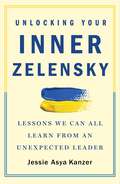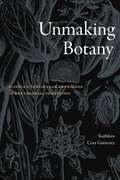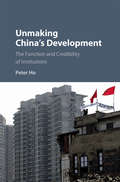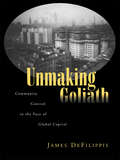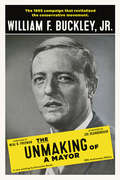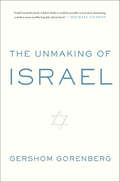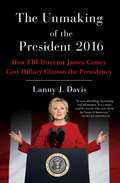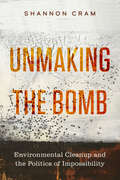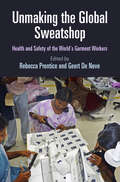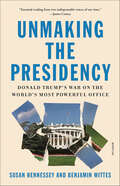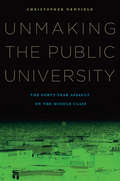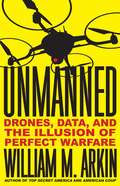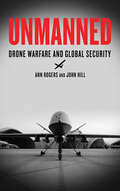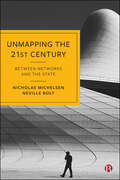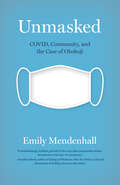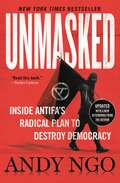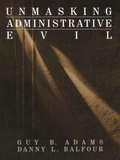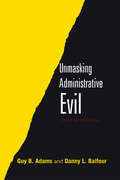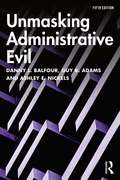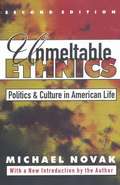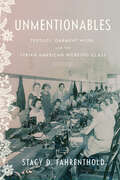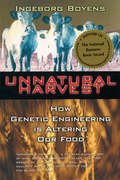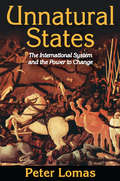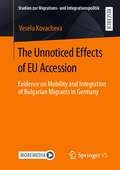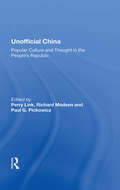- Table View
- List View
Unlocking Your Inner Zelensky: Lessons We Can All Learn from an Unexpected Leader
by Jessie Asya KanzerVolodymyr Zelensky captivated the world when his country was invaded by Russia in February 2022. His appearances were accompanied by countless inspiring statements. But there's a single one that informs Unlocking Your Inner Zelensky: "We are all simple people."Jessie Kanzer sees Zelensky as a Spiritual Leader for Our Times. As a Soviet refugee, she picks up on the deep philosophical ramifications behind his words. Rich and yet easy-to-read, the life lessons in Unlocking Your Inner Zelensky are accessible and wise, and are more about starting where you are than about war.Kanzer herself has a bit part in Zelensky's life story, acting in one of his movies filmed in the States. She's a self-described "spiritual nerd" who followed Zelensky long before he stood before a blue and yellow backdrop on the national stage. She writes, "What is so incredible about our man Volodymyr is that his belief in himself stems not from seeing himself as special, but from seeing himself as ordinary and from knowing there is great power in this ordinariness."
Unmaking Botany: Science and Vernacular Knowledge in the Colonial Philippines
by Kathleen Cruz GutierrezIn Anglo-European botany, it is customary to think of the vernacular as that which is not a Latin or Latinized scientific plant name. In Unmaking Botany, Kathleen Cruz Gutierrez traces a history of botany in the Philippines during the last decades of Spanish rule and the first decades of US colonization. Through this history, she redefines the vernacular, expanding it to include embodied, cosmological, artistic, and varied taxonomic practices. From the culinary textures of rice and the lyrics crooned to honor a flower to the touch of a skirt woven from banana fiber, she illuminates how vernaculars of plant knowing in the Philippines exposed the philosophical and practical limits of botany. Such vernaculars remained as sovereign forms of knowledge production. Yet, at the same time, they fueled botany’s dominance over other ways of knowing plants. Revealing this tension allows Gutierrez to theorize “sovereign vernaculars,” or insight into plants that made and unmade the science, which serves as a methodological provocation to examine the interplay of different knowledge systems and to study the history of science from multiple vantage points.
Unmaking China’s Development: The Function and Credibility of Institutions
by Peter HoWhy would the removal of authoritarian institutions in some developing countries lead to sustained socio-economic crisis, while others experience explosive growth despite "persisting" informal, insecure and rent-seeking institutional arrangements? A key to solving this enigma lies in understanding China, a country where the paradoxes of development are highly visible. Peter Ho argues that understanding China's economy necessitates an analytical refocusing from Form to Function, detached from normative assumptions about institutional appearance and developing instead a "Credibility Thesis". In this reading, once institutions endogenously emerge and persist through actors' conflicting interactions, they are credible. Ho develops this idea theoretically, methodologically, and empirically by examining institutions around the sector that propelled, yet, simultaneously destabilizes development: real estate - land, housing and natural resources. Ho shows how this sector can further both our understanding of institutions and issues of capital, labor, infrastructure and technology.
Unmaking Goliath: Community Control in the Face of Global Capital
by James DeFilippisArguing against those who say that our communities are powerless in the face of footloose corporations, DeFilippis considers what localities can do in the face of heightened capital mobility in order to retain an autonomy that furthers egalitarian social justice, and explores how we go about accomplishing this in practical, political terms.
The Unmaking of a Mayor
by William F. Buckley Jr.John V. Lindsay was elected mayor of New York City in 1965. But that year's mayoral campaign will forever be known as the Buckley campaign. "As a candidate," Joseph Alsop conceded, "Buckley was cleverer and livelier than either of his rivals." And Murray Kempton concluded that "The process which coarsens every other man who enters it has only refined Mr. Buckley."The Unmaking of a Mayor is a time capsule of the political atmosphere of America in the spring of 1965, diagnosing the multitude of ills that plagued New York and other major cities: crime, narcotics, transportation, racial bias, mismanagement, taxes, and the problems of housing, police, and education. Buckley's nimble dissection of these issues constitutes an excellent primer of conservative thought.A good pathologist, Buckley shows that the diseases afflicting New York City in 1965 were by no means of a unique strain, and compared them with issues that beset the country at large. Buckley offers a prescient vision of the Republican Party and America's two-party system that will be of particular interest to today's conservatives. The Unmaking of a Mayor ends with a wistful glance at what might have been in 1965-and what might yet be.
The Unmaking of Israel
by Gershom Gorenberg“Closely argued and conditionally apocalyptic . . . Gorenberg outlines many reasonable steps Israel should take to disentangle religion from the state.” —Jeffrey Goldberg, The New York Times Book ReviewProminent Israeli journalist Gershom Gorenberg offers a penetrating and provocative look at how the balance of power in Israel has shifted toward extremism, threatening the prospects for peace and democracy as the Israeli-Palestinian conflict intensifies. Informing his examination using interviews in Israel and the West Bank and with access to previously classified Israeli documents, Gorenberg delivers an incisive discussion of the causes and trends of extremism in Israel’s government and society. Michael Chabon, Pulitzer Prize-winning author of The Amazing Adventures of Kavalier and Clay, writes, “until I read The Unmaking of Israel, I didn’t think it could be possible to feel more despairing, and then more terribly hopeful, about Israel, a place that I began at last, under the spell of Gershom Gorenberg’s lucid and dispassionate yet intensely personal writing, to understand.”“At the core of the book lies a terrifying analogy: Israel as Pakistan, a country whose government has empowered a lawless, fanatical religious movement now subverting the very state that empowered it. Is the analogy apt today? No, but Gorenberg makes a frighteningly convincing case that it might be soon.” —Peter Beinart, Newsweek“Gorenberg provides a deft but penetrating and highly nuanced account of the recent history and current politics of Israel . . . He issues a heartfelt and heart-rending plea for the repair of the Jewish democracy.” —The Jewish Journal“Sure to raise contention, a strong dissenting voice from a burdened land where dissent is not simply tolerated, but a way of life.” —Kirkus Reviews
The Unmaking of the President 2016: How FBI Director James Comey Cost Hillary Clinton the Presidency
by Lanny J. DavisA longtime Washington insider argues that former FBI Director James Comey’s letter to Congress, sent just before the presidential election in 2016 was a key determining factor in Trump’s win: “Compelling criticism…lapsed Trump supporters might well open their minds to this attorney’s scholarly, entirely convincing proof of the damage done” (Kirkus Reviews, starred review).During the week of October 24, 2016, Hillary Clinton was decisively ahead of Donald Trump in many polls and, more importantly, in the battleground states of Wisconsin, Michigan, and Pennsylvania. Then FBI Director James Comey sent his infamous letter to Congress on October 28, saying the bureau was investigating additional emails that may have been relevant to the Hillary Clinton email case. In The Unmaking of the President 2016, attorney Lanny J. Davis shows how Comey’s misguided announcement—just eleven days before the election—swung a significant number of voters away from Clinton, winning Trump an Electoral College victory—and the presidency. Davis traces Clinton’s email controversy and Comey’s July 2016 appearance before Congress, in which he said the Clinton email matter was effectively closed. From that moment until Comey’s late October letter to Congress, Davis says, Clinton was destined to be elected president by substantial popular and electoral vote margins. But the decision to send his October 28 letter, so near to the election, not only violated long-standing justice department policies but also contained no new facts of improper emails at all—just pure speculation. Davis shows state by state, using polling data before October 28, and on election day, how voter support for Hillary Clinton eroded quickly. He proves that had the election been held on October 27, Hillary Clinton would have won the presidency by a substantial margin. Despite so many other issues in the closing days of the campaign—Trump’s behavior, the Russian hacking, reports of Clinton momentum in marginal states such as Georgia, Arizona, even Texas—after the October 28 Comey letter, everything changed. References to “Clinton emails” and “new criminal investigation” dominated media coverage virtually round-the-clock through election day November 8. Now Davis proves with raw, indisputable data how Comey’s October surprise cost Hillary Clinton the presidency and changed American history in the blink of an eye.
Unmaking the Bomb: Environmental Cleanup and the Politics of Impossibility (Critical Environments: Nature, Science, and Politics #14)
by Shannon CramWhat does it mean to reckon with a contaminated world? In Unmaking the Bomb, Shannon Cram considers the complex social politics of this question and the regulatory infrastructures designed to answer it. Blending history, ethnography, and memoir, she investigates remediation efforts at the Hanford Nuclear Reservation, a former weapons complex in Washington State. Home to the majority of the nation's high-level nuclear waste and its largest environmental cleanup, Hanford is tasked with managing toxic materials that will long outlast the United States and its institutional capacities. Cram examines the embodied uncertainties and structural impossibilities integral to that endeavor. In particular, this lyrical book engages in a kind of narrative contamination, toggling back and forth between cleanup's administrative frames and the stories that overspill them. It spends time with the statistical people that inhabit cleanup's metrics and models and the nonstatistical people that live with their effects. And, in the process, it explores the uneven social relations that make toxicity a normative condition.
Unmaking the Global Sweatshop: Health and Safety of the World's Garment Workers (Pennsylvania Studies in Human Rights)
by Rebecca Prentice Geert NeveThe 2013 collapse of Rana Plaza, an eight-story garment factory in Savar, Bangladesh, killed over a thousand workers and injured hundreds more. This disaster exposed the brutal labor conditions of the global garment industry and revealed its failures as a competitive and self-regulating industry. <P><P>Over the past thirty years, corporations have widely adopted labor codes on health and safety, yet too often in their working lives, garment workers across the globe encounter death, work-related injuries, and unhealthy factory environments. Disasters such as Rana Plaza notwithstanding, garment workers routinely work under conditions that not only escape public notice but also undermine workers' long-term physical health, mental well-being, and the very sustainability of their employment. <P><P>Unmaking the Global Sweatshop gathers the work of leading anthropologists and ethnographers studying the global garment industry to examine the relationship between the politics of labor and initiatives to protect workers' health and safety. Contributors analyze both the labor processes required of garment workers as well as the global dynamics of outsourcing and subcontracting that produce such demands on workers' health. <P><P>The accounts contained in Unmaking the Global Sweatshop trace the histories of labor standards for garment workers in the global South; explore recent partnerships between corporate, state, and civil society actors in pursuit of accountable corporate governance; analyze a breadth of initiatives that seek to improve workers' health standards, from ethical trade projects to human rights movements; and focus on the ways in which risk, health, and safety might be differently conceptualized and regulated. <P><P>Unmaking the Global Sweatshop argues for an expansive understanding of garment workers' lived experiences that recognizes the politics of labor, human rights, the privatization and individualization of health-related responsibilities as well as the complexity of health and well-being. <P><P>Contributors: Mark Anner, Hasan Ashraf, Jennifer Bair, Jeremy Blasi, Geert De Neve, Saydia Gulrukh, Ingrid Hagen-Keith, Sandya Hewamanne, Caitrin Lynch, Alessandra Mezzadri, Patrick Neveling, Florence Palpacuer, Rebecca Prentice, Kanchana N. Ruwanpura, Nazneen Shifa, Dina M. Siddiqi, Mahmudul H. Sumon.
Unmaking the Presidency: Donald Trump's War on the World's Most Powerful Office
by Susan Hennessey Benjamin Wittes"This is a book for everyone who has developed an unexpected nostalgia for political 'norms' during the Trump years . . . Other books on the Trump White House expertly detail the mayhem inside; this book builds on those works to detail its consequences." —Carlos Lozada (one of twelve books to read "to understand what's going on")"Perhaps the most penetrating book to have been written about Trump in office."—Lawrence Douglas, The Times Literary SupplementThe definitive account of how Donald Trump has wielded the powers of the American presidencyThe extraordinary authority of the U.S. presidency has no parallel in the democratic world. Today that authority resides in the hands of one man, Donald J. Trump. But rarely if ever has the nature of a president clashed more profoundly with the nature of the office. Unmaking the Presidency tells the story of the confrontation between a person and the institution he almost wholly embodies.From the moment of his inauguration, Trump has challenged our deepest expectations of the presidency. But what are those expectations, where did they come from, and how great is the damage? As editors of the “invaluable” (The New York Times) Lawfare website, Susan Hennessey and Benjamin Wittes have attracted a large audience to their hard-hitting and highly informed commentary on the controversies surrounding the Trump administration. In this book, they situate Trump-era scandals and outrages in the deeper context of the presidency itself. How should we understand the oath of office when it is taken by a man who may not know what it means to preserve, protect, and defend something other than himself? What aspects of Trump are radically different from past presidents and what aspects have historical antecedents? When has he simply built on his predecessors’ misdeeds, and when has he invented categories of misrule entirely his own? By setting Trump in the light of history, Hennessey and Wittes provide a crucial and durable account of a presidency like no other.
Unmaking the Public University: The Forty-Year Assault on the Middle Class
by Christopher NewfieldAn essential American dream—equal access to higher education—was becoming a reality with the GI Bill and civil rights movements after World War II. But this vital American promise has been broken. Christopher Newfield argues that the financial and political crises of public universities are not the result of economic downturns or of ultimately valuable restructuring, but of a conservative campaign to end public education’s democratizing influence on American society. Unmaking the Public University is the story of how conservatives have maligned and restructured public universities, deceiving the public to serve their own ends. It is a deep and revealing analysis that is long overdue. Newfield carefully describes how this campaign operated, using extensive research into public university archives. He launches the story with the expansive vision of an equitable and creative America that emerged from the post-war boom in college access, and traces the gradual emergence of the anti-egalitarian “corporate university,” practices that ranged from racial policies to research budgeting. Newfield shows that the culture wars have actually been an economic war that a conservative coalition in business, government, and academia have waged on that economically necessary but often independent group, the college-educated middle class. Newfield’s research exposes the crucial fact that the culture wars have functioned as a kind of neutron bomb, one that pulverizes the social and culture claims of college grads while leaving their technical expertise untouched. Unmaking the Public University incisively sets the record straight, describing a forty-year economic war waged on the college-educated public, and awakening us to a vision of social development shared by scientists and humanists alike.
Unmanned: Drones, Data, and the Illusion of Perfect Warfare
by William M. ArkinUNMANNED is an in-depth examination of why seemingly successful wars never seem to end. The problem centers on drones, now accumulated in the thousands, the front end of a spying and killing machine that is disconnected from either security or safety.Drones, however, are only part of the problem. William Arkin shows that security is actually undermined by an impulse to gather as much data as possible, the appetite and the theory both skewed towards the notion that no amount is too much. And yet the very endeavor of putting fewer human in potential danger places everyone in greater danger. Wars officially end, but the Data Machine lives on forever.Throughout his career, Arkin has exposed powerful secrets of so-called national security and intelligence. Now he continues that tradition. The most alarming book about warfare in years, UNMANNED is essential reading for anyone who cares about the future of mankind.
Unmanned: Drone Warfare and Global Security
by Ann Rogers John HillDrones have become the controversial new weapon of choice for the US military abroad. Unmanned details the causes and deadly consequences of this terrifying new development in warfare, and explores the implications for international law and global peace. Ann Rogers and John Hill argue that drones represent the first truly globalized technology of war. The book shows how unmanned systems are changing not simply how wars are fought, but the meaning of conflict itself. Providing an unparalleled account of new forms of twenty-first century imperial warfare, Unmanned shows how drone systems dissolve the conventional obstacles of time and space that have traditionally shaped conflict in the international system. It considers the possibility that these weapons will become normalized in global conflict, raising the spectre of new, unpredictable, and unaccountable forms of warfare.
Unmapping the 21st Century: Between Networks and the State
by Nicholas Michelsen Neville BoltThe 21st century has been characterized by great turbulence, climate change, a global pandemic, and democratic decay. Drawing on post-structural political theory, this book explores two dominant concepts used to make sense of our disturbed reality: the state and the network. The book explains how they are inextricably interwoven, while showing why they complicate the way we interpret our present. In seeking a better understanding of today’s world, this book argues that we need to pull apart the familiar lines of our maps. By looking beneath and across these lines, an ‘unmapping’ presents new insights and opportunities for a better future.
Unmasked: COVID, Community, and the Case of Okoboji
by Emily MendenhallUnmasked is the story of what happened in Okoboji, a small Iowan tourist town, when a collective turn from the coronavirus to the economy occurred in the COVID summer of 2020. State political failures, local negotiations among political and public health leaders, and community (dis)belief about the virus resulted in Okoboji being declared a hotspot just before the Independence Day weekend, when an influx of half a million people visit the town. The story is both personal and political. Author Emily Mendenhall, an anthropologist at Georgetown University, grew up in Okoboji, and her family still lives there. As the events unfolded, Mendenhall was in Okoboji, where she spoke formally with over 100 people and observed a community that rejected public health guidance, revealing deep-seated mistrust in outsiders and strong commitments to local thinking. Unmasked is a fascinating and heartbreaking account of where people put their trust, and how isolationist popular beliefs can be in America's small communities.
Unmasked: Inside Antifa's Radical Plan to Destroy Democracy
by Andy NgoA journalist who's been attacked by Antifa writes a deeply researched and reported account of the group's history and tactics. When Andy Ngo was attacked in the streets by Antifa in the summer of 2019, most people assumed it was an isolated incident. But those who'd been following Ngo's reporting in outlets like the New York Post and Quillette knew that the attack was only the latest in a long line of crimes perpetrated by Antifa. In Unmasked, Andy Ngo tells the story of this violent extremist movement from the very beginning. He includes interviews with former followers of the group, people who've been attacked by them, and incorporates stories from his own life. This book contains a trove of documents obtained by the author, published for the first time ever. <P><P><b>A New York Times Bestseller</b>
Unmasking Administrative Evil
by Guy B. Adams Danny L. BalfourAlthough social scientists generally do not discuss "evil" in an academic setting, there is no denying that it has existed in public administration throughout human history. Hundreds of millions of human beings have died as a direct or indirect consequence of state-sponsored violence. The authors argue that administrative evil, or destructiveness, is part of the identity of all modern public administration (as it is part of psychoanalytic study at the individual level). It goes beyond a superficial critique of public administration and lays the groundwork for a more effective and humane profession.
Unmasking Administrative Evil
by Guy Adams Danny BalfourThe modern age with its emphasis on technical rationality has enabled a new and dangerous form of evil--administrative evil. Unmasking Administrative Evil discusses the overlooked relationship between evil and public affairs, as well as other fields and professions in public life. The authors argue that the tendency toward administrative evil, as manifested in acts of dehumanization and genocide, is deeply woven into the identity of public affairs. The common characteristic of administrative evil is that ordinary people within their normal professional and administrative roles can engage in acts of evil without being aware that they are doing anything wrong. Under conditions of moral inversion, people may even view their evil activity as good. In the face of what is now a clear and present danger in the United States, this book seeks to lay the groundwork for a more ethical and democratic public life; one that recognizes its potential for evil, and thereby creates greater possibilities for avoiding the hidden pathways that lead to state-sponsored dehumanization and destruction. What's new in the Fourth Edition of Unmasking Administrative Evil: UAE is updated and revised with new scholarship on administrative ethics, evil, and contemporary politics. The authors include new cases on the dangers of market-based governance, contracting out, and deregulation. There is an enhanced focus on the potential for administrative evil in the private sector. The authors have written a new Afterword on administrative approaches to the aftermath of evil, with the potential for expiation, healing, and reparations.
Unmasking Administrative Evil
by Danny L. Balfour Guy B. Adams Ashley E. NickelsThe relationship between evil and public affairs, as well as other fields and professions in public life, has come to the fore as institutions of government seek new ways to operate in an environment of extreme mistrust. Unmasking Administrative Evil, 5th Edition argues that the tendency toward administrative evil, as manifested in acts of dehumanization and genocide, is deeply woven into the identity of public affairs. Indeed, ordinary people may simply act appropriately in their organizational role—in essence, just doing what those around them would agree they should be doing—and at the same time, participate in what a critical and reasonable observer, usually well after the fact, would call evil. Even worse, under conditions of moral inversion, ordinary people can all too easily engage in acts of administrative evil while believing that what they are doing is not only correct, but in fact, good. This 5th edition offers important updates, including: A thorough discussion of contemporary virtue ethics as the field has evolved to offer an alternative to technical/rational ethics. An all-new three-part structure (What is Administrative Evil?, History and Cases, and The Future of Ethics in Praetorian Times) designed to aid in course organization and instruction. All-new cases, including an examination of the Flint water disaster, to provide contemporary examples of how populations can be marginalized and harmed by administrative processes that are blind to their consequences until it is too late. Laying the groundwork for a more ethical and democratic public life – one that recognizes its potential for evil, and avoids state-sponsored dehumanization and destruction – Unmasking Administrative Evil, 5th Edition is required reading for all students of administrative ethics and public service ethics, as well those in other administrative sciences.
Unmeltable Ethnics: Politics And Culture In American Life (Second Edition)
by Michael NovakThis new, enlarged edition of an influential book--originally published in 1972 as The Rise of the Unmeltable Ethnics--extends the author's wise and generous view of ethnicity. Its aim "is to raise consciousness about a crucial part of the American experience: to involve each reader in self-inquiry. Who, after all, are you? What history brought you to where you are? Why are you different from others?" But the point of such inquiry is civility: "The new ethnic consciousness embodied in this book delights in recognition of subtle differences in the movements of the soul. It is not a call to separatism but to self-consciousness. It does not seek division but rather accurate, mutual appreciation."
Unmentionables: Textiles, Garment Work, and the Syrian American Working Class (Worlding the Middle East)
by Stacy FahrentholdAs weavers, garment workers, and peddlers, Syrian immigrants in the Americas fed the early twentieth-century transnational textile trade. These migrants and the commodities they produced—silk, linen, and cotton; lace and embroidery; undergarments and ready-wear clothing—moved along steamship routes from Beirut through Marseille and Madeira to New York City, New England, and Veracruz. As migrants and merchants crisscrossed the Atlantic in pursuit of work, Syrian textile manufacturing expanded across the hemisphere. Unmentionables offers a history of the global textile industry and the Syrians, Lebanese, and Palestinians who worked in it. Stacy Fahrenthold examines how Arab workers navigated processes of racialization, immigration restriction, and labor contestation. She writes women workers—the majority of Syrian garment workers—back into US labor history. She also situates the rise of Syrian American industrial elites, who exerted supply chain power to combat labor uprisings, resist unionization, and stake claim to the global textile industry. Critiquing the hegemony of the Syrian peddler in histories of this diaspora, Unmentionables introduces alternative narrators: union activists who led street demonstrations, women garment workers who shut down kimono factories, child laborers who threw snowballs at police, and the diasporic merchant capitalists who contended with all of them.
Unnatural Harvest: How Genetic Engineering is Altering Our Food
by Ingeborg BoyensAdvertisers may want us to believe that our food is produced on picturesque farms, but the cold reality is that the plants and animals we consume may be the result of genetic engineering in the laboratories of multinational corporations.Biotechnology brings with it implications for human and animal health, the threat of environmental damage, a possible redefining of our global food system and a Pandora's box of ethical questions. But the consuming public remains virtually unaware of the genetic alterations of their food and what that may hold in store.Thoroughly researched and accessibly written, Unnatural Harvest holds nothing back in telling us how the food we now serve ourselves and our children may be altered and why we should be very concerned.
Unnatural States: The International System and the Power to Change
by Peter Ian LomasUnnatural States is a radical critique of international theory, in particular, of the assumption of state agency—that states act in the world in their own right. Peter Lomas argues that since the universal states system is inequitable and rigid, and not all states are democracies anyway, this assumption is unreal, and to adopt it means reinforcing an unjust status quo.Looking at the concepts of state, nation, and agency, Lomas sees populations struggling to find an agreed model of the state, owing to inherited material differences; and unsurprisingly, among theorists of the nation, only controversy and a great confusion of terms. Meanwhile, the functional incarnations of the state agent are caricatures: the mandarin state, the lawyer state, the landlord state, the heir-to-history state, and the patriot state. Yet recent developments in international theory (constructivism, scientific realism, postmodernism) sacrifice state agency only at the price of an unhelpful abstraction.The states system is dysfunctional and obsolete, Lomas contends, and international theory must be recast, with morality as central, to inspire and to guide historic change. He focuses in his conclusion on prescriptions for change, led by four moral concerns: human rights, weapons of mass destruction, relations between rich and poor societies, and the environment."I begin this book," writes Lomas, "with the commonest commonplace of international theory, to expose it as a meaningless cliche. In the masterly hands of Hobbes, it was elaborated into a shock formula for organized society, a reading of history as civilization's failure. Kant sought to rescue morality from Hobbes and create the structures of modernity, but Kant's influence is coming to an end. In the Cold War, politicians disagreeing over another philosopher almost brought the world to an end. Hence the challenges of our time. These are primary and profound. Philosophers have done much to define the modern world. The point of international theory is to change it."
The Unnoticed Effects of EU Accession: Evidence on Mobility and Integration of Bulgarian Migrants in Germany (Studien zur Migrations- und Integrationspolitik)
by Vesela KovachevaThis study provides empirical evidence on the considerable but often unnoticed impact of EU accession on the mobility and integration of migrants from Bulgaria in Germany. Original data from a time-location sampling survey in Hamburg reveal that free movement not only induced a high level of mobility among EU citizens from Bulgaria after 2007 but also enabled their more permanent settlement in Germany. The study also provides statistical evidence that EU citizenship contributed to better legal integration of Bulgarian migrants in Germany, but national policies shaped to a greater extent their integration in terms of participation in the core areas of life. Restrictive policies such as transitional periods in the freedom of work hampered labour market integration and created more disadvantaged positions for workers. Inclusive policies such as the dual citizenship policy facilitated the naturalisation of settled migrants and led to exceptionally high naturalisation rates for Bulgarians that point to their successful integration in society. However, integration successes remain almost unnoticed in public discourse, which is dominated by the image of Bulgarian migration as a challenge.
Unofficial China: Popular Culture And Thought In The People's Republic
by Perry LinkThis book presents a view of social life in China and discusses different methods for studying contemporary China as a tool for introducing students to the study of popular culture. Through a diverse set of case studies, it introduces readers to a wide range of issues facing Chinese society.
